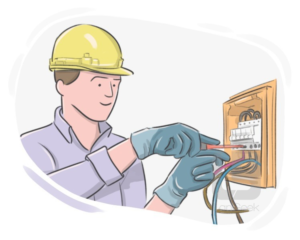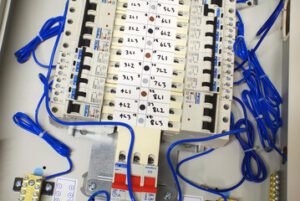The first step in becoming a skilled electrician is training. Most programs offer apprenticeships that combine paid on-the-job experience with related classroom instruction. Contact Fort Worth TX Electricians now!
Electricians read blueprints — technical diagrams that show the locations of circuit breakers, outlets, and other equipment. They also use handtools and power tools to install wiring. They may also use a digital multimeter to check voltage levels without disrupting the circuit.

Electricians are skilled professionals who specialize in the installation and repair of electrical wiring, fixtures and equipment. They use a wide variety of tools and systems to complete their work. They must be knowledgeable about electrical codes and safety protocols. In addition, electricians often collaborate with other tradespeople and customers, so good communication skills are essential.
While a career as an electrician can be very rewarding, it is also quite demanding. Some of the job duties include executing electrical wiring plans, installing fixtures and equipment, repairing appliances and establishing backup power sources. Others may also be responsible for inspecting and testing electrical wiring, equipment, systems and structures.
The type of work performed by an electrician depends on the industry and company in which they work. For example, industrial electricians may be hired to install and repair electrical wiring and equipment in factories. These facilities often house high-powered machines that require more advanced and sophisticated electrical systems than other types of facilities. Industrial electricians may also be hired to assist in the maintenance and upkeep of these equipment, as well as help to keep the facility in compliance with applicable regulations.
Other electricians may be employed by private businesses and perform services such as electrical system audits, installation of lighting fixtures and wiring, and other related tasks. These individuals are also responsible for assisting with the inspection and testing of electrical systems, as well as helping to prepare reports and documents for clients.
Aspiring electricians can improve their employment prospects by pursuing certifications in specific areas of specialization. By doing this, they can increase their value to a particular employer and potentially boost their salary. It is also important for electricians to stay current on the latest trends and technology in their field by taking after hours classes or online tutorials.
While there are a number of different jobs that an electrician can pursue, this career is generally projected to remain in demand. According to the Bureau of Labor Statistics, there are more jobs available than there are qualified electricians to fill them. As a result, salaries for this position tend to be competitive with other similarly skilled tradespeople.
Education Requirements
After completing the education requirements for electricians, such as receiving a high school diploma or GED certificate, aspiring electricians may enroll in an apprenticeship program to acquire the necessary skills and training. This can take 4-5 years and includes both theory instructions and extensive on-the-job experience. Many apprentices go on to become a journeyman electrician after gaining enough practical work experience under the supervision of a master electrician.
An alternative route for aspiring electricians is to attend trade school programs that offer certification courses. These schools usually focus on hands-on learning and provide students with the tools and training they need to work in the field. Some of these programs also allow students to earn an associate degree in a relevant area such as electrical technology, which can open up the door to obtaining a four-year bachelor’s degree later on in their career.
Those who want to make their own mark in the industry may consider starting their own electrical contracting business. While this may be a challenge, it can be highly rewarding and give electricians greater control over their careers. In order to get started, however, they will need to have a good understanding of the current state and future trends in electrical work.
Some electricians specialize in specific fields such as renewable energy systems, fire alarms or smart home technology. This allows them to increase their marketability and command higher pay for their work. It also helps if they are certified as an electrician in their chosen field, as this will boost their employment opportunities.
The most common jobs for electricians include working on power lines, repairing or installing electrical equipment in factories, hospitals, commercial buildings and residential homes. Other electricians work for government agencies or utility companies, adding the electricity needed to power new construction sites or ensuring existing electrical infrastructure is safe and secure.
Electricians who are employed by government agencies or utility companies are often provided with a variety of benefits, including medical and dental insurance, life and disability insurance, paid time off, bonus potential, use of company tools and safety equipment (as opposed to owning your own), and ongoing opportunities for training and development.
Training Requirements
An individual who wants to become a professional electrician must complete a state-approved trade school program and an apprenticeship. In addition, the individual must pass an exam to demonstrate his or her understanding of electrical work. The career path also includes continual learning and advancement opportunities, which helps to keep an electrician on the cutting edge of the industry.
Trade schools offer students hands-on experience with classroom instruction, labs and practical training. Apprenticeships, which combine on-the-job experience and classroom education, are often preferred by employers. After completing the apprenticeship, an individual must earn his or her journeyman electrician license to advance in the field. Some electricians also choose to pursue specialized certifications or continuing education programs to help them stay up to date with new technologies and best practices.
Electricians who specialize in industrial electrical projects are responsible for installing, repairing and maintaining a range of power systems. These include generators, electrical motors and control panels. They must also understand the intricacies of industrial processes and machinery to ensure safe operation. An electrical engineering minor may be beneficial for individuals who want to work in the field of industrial electricity, as it provides a foundational understanding of manufacturing and automation processes.
An electrician specializing in residential wiring is primarily concerned with the installation and repair of electrical devices, outlets and wires. He or she must be proficient at reading blueprints and interpreting color-coded wiring. The job often involves working on ladders or scaffolding, and it requires the ability to stand for prolonged periods of time.
Electricians specializing in commercial electrical work are often required to perform a wide variety of tasks, from running wires and lighting fixtures to testing equipment and monitoring energy consumption. They must also be familiar with building codes and regulations to ensure that their installations meet standards. An additional qualification for electricians who work on large construction sites is knowledge of programmable logic controllers, which are used to automate processes and control equipment.
Electricians who work with high-voltage electrical power must undergo extensive training to learn how to handle and operate the equipment correctly. They typically wear protective clothing, such as gloves and goggles, and must complete rigorous safety courses before they are allowed to work on live equipment.
Work Environment
A career as an electrician requires attention to detail and strict adherence to safety protocols. This often requires work in cramped and physically challenging environments. Additionally, the unpredictability of work calls and potential hazards can disrupt routines and limit personal time. While these factors can be difficult to manage, prioritizing professional development and effective time management practices can help Electricians maintain a healthy work-life balance.
The physical demands of this job can result in chronic fatigue, which can have health and family-related consequences. To avoid this, an electrician should make sure to get enough rest and regularly engage in enjoyable activities like exercise and time with loved ones. In addition, a balanced lifestyle will allow electricians to attend to work-related issues promptly, which can reduce the risk of error that could have serious consequences.
Electricians work with a variety of materials, tools and equipment. Depending on their specialty, they may repair or install electrical circuits and motors in homes, commercial buildings, factories and other large-scale structures. They also install and service a wide range of power systems, including generators and high-voltage switchgear.
In some cases, a skilled electrician can even troubleshoot and repair computerized controls, including those that monitor water level or air pressure in tanks. Other responsibilities include working with overhead transmission lines, connecting power to a building, and installing GFCI outlets, which are designed to prevent electrical shock.
To ensure the quality of their work, a trained electrician will utilize a number of tools, including hand and power tools, wire strippers, voltage testers and pliers. They will also use a computer and word processing and computer-aided drafting software to develop electrical schematics. They will also install, test and inspect wiring and electrical equipment that includes but is not limited to generators, high-voltage switchgear, control centers and potential/current transformers up to 7,000 HP.
In some cases, a senior Electrician will assume leadership roles, either running their own electrical business or leading large teams of electricians. This can often require extended hours and overnight travel, which can impact routines and personal relationships. In these situations, utilizing administrative support services and delegating tasks to experienced employees can enable senior electricians to meet project deadlines without sacrificing personal time.
